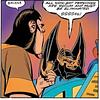You need to sign in or sign up before continuing.
Take a photo of a barcode or cover

subplotkudzu 's review for:
Killashandra
by Anne McCaffrey
After having just read Crystal Singer this was distinctly underwhelming. Part of it is that Crystal Singer, for all of its later editing, is still based on McCaffery's 1970's short fiction which contained a lot of the primal energy you see in pulp authors. The difference in energy between those stories and this later book is the same as the difference between her very primal early Pern fiction that won a Hugo and the later YA targeted fiction of the the Pern books. It's not bad, per se, it's just very much not the same thing. The SF world building of the first book didn't carry over much. There is certainly the potential for this series to have a different take on the galactic politics of Dune as the core idea of spaceflight and interstellar communications being dependent on the output of this one world's unique materials exists in both, but it's never explored.
It's also a very different book in plot and tone. The nominal plot is that Killashandra is tasked to deliver a load of the crystal she just cut to a world that strives for pastoral naturalism with the native ecosphere and is socially centered around its music academy. The world has a ban on natives leaving the planet, and the galactic government wants to make sure this is a popular measure and not an unwanted level of societal control; Killashanda's mission to deliver the crystal and repair their crystal organ makes her a good agent to check that out. As you can imagine, there are nefarious doings on the planet that are kicked into the open by her investigation. All well and good, perfectly sound adventure stuff.
But this isn't the real point of the book - the real point of the book is Killasandra learning to love like and adult rather than a youth. The framing sequence goes into some detail on her ongoing affair with the guildmaster, how it's functionally doomed and how she has to give it up, a period of wallowing self pity, then finding a man who is her actual equal (as opposed to the guildmaster, who is 100 years older than her and can read her facial expressions as if by telepathy) and can she and her new love find a way to be together. This has some clumsy bits when viewed with modern sensibilities, but there's nothing in it that you wouldn't find in a romance novel, just with all constantly referenced sex scenes being cut out (and yes, this is two healthy energetic people in their 20's with extraordinary chemistry starting a relationship, so Killashandra thinks with her crotch at several points).
This merging of action plot vs. emotional plot just ended up not jelling for me. The action plot vanishes for stretches, then comes back in a truncated version for the endgame with outside actors coming in to drive the plot and ultimately resolve issues off screen. There was definitely a better book in here that melded the mystery plot and romance plot (Nora Roberts has tons of these) but while the emotional aspect worked the technical one didn't.
It's also a very different book in plot and tone. The nominal plot is that Killashandra is tasked to deliver a load of the crystal she just cut to a world that strives for pastoral naturalism with the native ecosphere and is socially centered around its music academy. The world has a ban on natives leaving the planet, and the galactic government wants to make sure this is a popular measure and not an unwanted level of societal control; Killashanda's mission to deliver the crystal and repair their crystal organ makes her a good agent to check that out. As you can imagine, there are nefarious doings on the planet that are kicked into the open by her investigation. All well and good, perfectly sound adventure stuff.
But this isn't the real point of the book - the real point of the book is Killasandra learning to love like and adult rather than a youth. The framing sequence goes into some detail on her ongoing affair with the guildmaster, how it's functionally doomed and how she has to give it up, a period of wallowing self pity, then finding a man who is her actual equal (as opposed to the guildmaster, who is 100 years older than her and can read her facial expressions as if by telepathy) and can she and her new love find a way to be together. This has some clumsy bits when viewed with modern sensibilities, but there's nothing in it that you wouldn't find in a romance novel, just with all constantly referenced sex scenes being cut out (and yes, this is two healthy energetic people in their 20's with extraordinary chemistry starting a relationship, so Killashandra thinks with her crotch at several points).
This merging of action plot vs. emotional plot just ended up not jelling for me. The action plot vanishes for stretches, then comes back in a truncated version for the endgame with outside actors coming in to drive the plot and ultimately resolve issues off screen. There was definitely a better book in here that melded the mystery plot and romance plot (Nora Roberts has tons of these) but while the emotional aspect worked the technical one didn't.